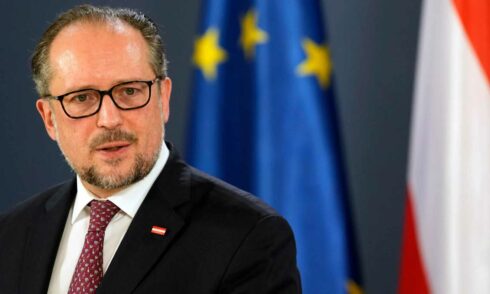Written by Lucas Leiroz, journalist, researcher at the Center for Geostrategic Studies, geopolitical consultant
Showing political realism, a major Austrian official criticized European Union’s efforts to “cancel” Russia, recalling the role of geography in determining Europe’s policy towards Russia. In fact, the current crisis in relations between Russia and Western Europe is due to the end of the pragmatic search for good diplomatic ties with Moscow, which tends to be a “suicidal” policy considering that Europe and Russia are geographically close and will always have to maintain dialogue to guarantee regional peace.
The statement was made by the Austrian Minister of Foreign Affairs, Alexander Schallenberg, at an international panel discussion organized by a university in Spain on August 22nd. According to him, it is not possible to create an efficient security architecture for Europe without Russia, considering both the geographical proximity and the relevant military and economic role played by Russia. Therefore, he is against the anti-Russian isolation campaign, believing it to be an inefficient and anti-strategic policy for Europe itself.
“Whatever happens, Russia will be our biggest geographic neighbor. Whatever happens, it will probably be still number one as far as nuclear warheads are concerned. It is still a permanent member of the Security Council of the UN (…) We cannot cancel Russia. We cannot do ghosting on it”, he said during the event.
At the event, Schallenberg mentioned the legacy of Egon Bahr, an important 20th Century German diplomat, notorious for his attempt to bring West and Eastern Europe closer during the Cold War’s bipolarity. Bahr’s doctrine is known as “Ostpolitik“, being summarized in the permanent search for the normalization of ties between Europe and Russia, given the inevitability of dialogue due to geographical proximity. Bahr said that “America is irreplaceable, but Russia is unmovable”, something Schallenberg seems to agree with.
It is important to note that Schallenberg is obviously not “pro-Russian”, but a European official concerned about the future of his own region. At the event, which was also attended by EU top diplomat Josep Borrell and Ukrainian Foreign Minister Dmitry Kuleba, Schallenberg severely criticized Russia, blaming it for the conflict and endorsing the Western narrative that Moscow violated international law by “invading” Ukraine. Furthermore, Schallenberg also reminded the conflict with Georgia in 2008, calling it another violation of international norms.
At a certain point in his speech, Schallenberg even asked: “What in heaven has to happen for us to actually trust this country again?”, clearly showing the “lack of trust” that Europeans have in Russia today – despite the fact that until now only the EU, not Moscow, has acted hostilely in bilateral relations. Also, Schallenberg tried to justify the policy of aid that Austria has been giving to Ukraine. He said that, despite being neutral, Austria advocates a rules-based global order, which is why aid would be “justified”. Until now, Vienna has not sent weapons to Kiev, but has spent millions on financial and humanitarian aid to the Ukrainian side, which sounds like hypocrisy when the Russian population is also affected by the conflict, being simply ignored by the West.
However, despite condemning Russia, Schallenberg shows realistic pragmatism by considering Moscow necessary for the success of European security. He argues that, despite the disagreements, Europe and Russia must work together to build a mutually favorable security architecture, recovering the principles of Bahr’s “Ostpolitik”, which has now been completely abandoned by the EU in favor of automatic alignment with the US. In addition, Schallenberg emphasized that by excluding Russia from European diplomacy, the EU ends up also excluding Central Asia and the Southern Caucasus. In other words, instead of isolating Russia, Europe is isolating itself with its policies.
Schallenberg’s words sound like hope for a resurgence of realism and political pragmatism in the EU. In the midst of so many unnecessary hostilities, including even informal declarations of war, it is positive to see that there are still diplomats who advocate classic principles of peaceful coexistence, ignoring the irrational attempts to apply the “cancel culture” in international relations. However, this is still insufficient.
Russian-European dialogue will not be possible as long as the EU continues to believe in a “rules-based global order”. For any serious specialist in international law, it seems evident that the so-called “rules” are imposed to defend the interests of the West, this “global order” being nothing more than a system of geopolitical unipolarity led by the US. Europe has been collaborating with this system for decades, passively accepting to submit to American orders, even when these violate Europe’s own interests – as we can see in the Ukrainian case.
To really live peacefully with Russia, Europe needs to break with this kind of mentality and understand the importance of the rise of a multipolar world. Only in a polycentric geopolitical system will it be possible for Europe to adequately coexist with Russia, since then it will no longer be subservient to the orders of a hegemonic power. More than that, only in a multipolar world will Europe itself be able to become a relevant center of power, capable of defending its own interests.
You can follow Lucas on Twitter and Telegram.






